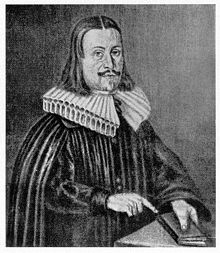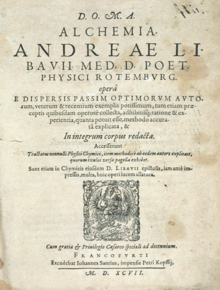Andreas Libavius
Andreas Libavius , also: Libau ; Basilius de Varna (* after 1555 in Halle an der Saale ; † July 25, 1616 in Coburg ) was a universal scholar of his time as a schoolboy , philosopher , doctor and chemist . He is considered a co-founder of modern chemistry .
Life
Libavius was born between 1555 and 1560 as Andreas Libau, son of the linen weaver Johann Liebau. Andreas Libavius attended high school in Halle and began in 1576 at the University of Wittenberg and from 1577 at the University of Jena , the subjects philosophy and history to study, where he the academic degree of Magister acquired the liberal arts. He also attended lectures on medicine in Jena . Libavius then worked as a teacher, first from 1581 in Ilmenau and from 1586 as the city and council school rector in Coburg. In 1588 he went to Basel and received his doctorate in medicine from the university there . At the end of the same year he began to give lectures on history and poetics as a professor at the University of Jena. He also led medical disputations .
He became a city physician in Rothenburg ob der Tauber in 1591 and a school inspector a year later. In 1606 he received an offer from Duke Johann Casimir to lead the newly founded high school Casimirianum in Coburg as rector , where he worked from 1607 until his death in 1616 as "director and professor primarius".
Works
Libavius' theological publications turned against the Jesuit Jakob Gretser . These are Analysis dialectica colloqui Ratisbonensis from 1603 and Gretserus triumphans from 1604, which were published under the name Basilius de Varna , an anagram from Andreas Libavius .
In 1597 the Alchemia , his most famous treatise, was published, in which he describes, among other things, the possibility of transmutation . It was the first systematic book in chemistry. The traditional chemical recipe literature, theoretical considerations that go back to ancient Greece, and alchemy (conversion of metals) were combined and treated not as secret literature, but in a humanistic spirit, accessible to all those interested. So he showed with the copper salt solutions - produced z. B. from separating water and bronze - that these can be detected with the help of ammonia ("ammonia spirit") through a deep blue color ( cation separation ). The first edition did not contain any illustrations, only the second edition from 1606 ( Alchymia ) was richly illustrated.
Other works included the four-part book Singularia from 1599, which contains a collection of descriptions and discussions about medical and scientific phenomena. 1610 Fountain writing appeared from Libavius Tractatus Medicus Physicus and Historia of fürtrefflichen Casimirianischen SawerBrunnen under Libenstein not far from Schmalkalden located , one of the first wells magazines in Germany. In Syntagmatis alchamiae arcanorum of 1615 he described the production of tin chloride , which was discovered in 1605 and is therefore also named after him as Spiritus fumans Libavii . However, the Franciscan Ulmannus had already mentioned tin chloride in 1419 in the Book of the Holy Trinity .
Libavius exercised well-founded criticism of the chemiatry of Paracelsus , widely advocated his teachings, but without the astrological and spiritual interpretations, and advocated his chemical medicines in particular. In his treatise, he contradicted the Brotherhood of the Rosicrucians , concerns about the fama and confession of the Brotherhood of the Rosicrucian .
Other works
- Neoparacelsica , Frankfurt am Main 1594
- Tractatus duo physici , Frankfurt am Main 1594
- Counter report from the Panacea Amwaldina, based on Georg vom Waldt's report . Frankfurt am Main 1595
- Singularium pars prima ... pars secunda , Frankfurt am Main 1595
- Analysis dialéctica colloquii Ratisbonensis , Frankfurt am Main 1602
- Poemata epica, lyrica, et elegica , Frankfurt am Main 1602
- Alchemical Practic , Frankfurt am Main 1603 ( digitized version )
- Gretserus triumphatus , Frankfurt am Main 1604
- Alchymia triumphans , Frankfurt am Main 1607
- Wolmeinendes Bedencken / Von der Fama, and Confession of the Brotherhood of deß Rosen Creutzes , Frankfurt am Main 1616
literature
- Wlodzimierz, Hubicki: Libavius (or Libau), Andreas . In: Charles Coulston Gillispie (Ed.): Dictionary of Scientific Biography . tape 8 : Jonathan Homer Lane - Pierre Joseph Macquer . Charles Scribner's Sons, New York 1973, p. 309-312 .
- Walther Killy (Ed.): Literature Lexicon. Authors and works in German (15 volumes). Bertelsmann-Lexikon-Verlag, Gütersloh and Munich 1988–1991 (CD-ROM: Berlin 1998, ISBN 3-932544-13-7 )
- Herbert Kühnert: The gold-ruby glass in the light of "Alchemia" by Andreas Libavius . Reprint from: Yearbook of the Coburg State Foundation 1968.
- Albert Ladenburg : Libavius, Andreas . In: Allgemeine Deutsche Biographie (ADB). Volume 18, Duncker & Humblot, Leipzig 1883, pp. 530-532.
- Wolf-Dieter Müller-Jahncke : Andreas Libavius in the light of the history of chemistry . Yearbook of the Coburg State Foundation 1972.
- Wolf-Dieter Müller-Jahncke: Libavius, Andreas. In: Werner E. Gerabek , Bernhard D. Haage, Gundolf Keil , Wolfgang Wegner (eds.): Enzyklopädie Medizingeschichte. De Gruyter, Berlin / New York 2005, ISBN 3-11-015714-4 , p. 849 f.
- Friedemann Rex : Alchemy of Andreas Libavius. Verlag Chemie, Weinheim 1964, ISBN 3-527-25004-2
- Friedemann Rex: Libavius, Andreas. In: New German Biography (NDB). Volume 14, Duncker & Humblot, Berlin 1985, ISBN 3-428-00195-8 , p. 441 f. ( Digitized version ).
- Libauius, Andr. In: Johann Heinrich Zedler : Large complete universal lexicon of all sciences and arts . Volume 17, Leipzig 1738, column 765 f.
- Peter Forshaw: Paradoxes, Absurdities, and Madness : Conflict over Alchemy, Magic and Medicine in the Works of Andreas Libavius and Heinrich Khunrath, Early Science and Medicine 13 (2008) 53-81, online
- The Liebensteiner Brunnenschrift from 1610 - On the healing power and the history of the Casimirian Sauerbrunnen. Heinrich-Jung-Verlagsgesellschaft, Zella-Mehlis 2016, ISBN 978-3-943552-13-3
Web links
- Literature by and about Andreas Libavius in the catalog of the German National Library
- Works by and about Andreas Libavius in the German Digital Library
- Libavius ( Memento from February 20, 2008 in the Internet Archive ) on museumonline.at
Individual evidence
- ↑ The first textbook on chemistry: Andreas Libavius' Alchemia (Frankfurt, 1597) , ETH-Bibliothek 2019, for the first edition in 1597 in your possession
- ↑ Hans-Werner Schütt: In search of the philosopher's stone. The history of alchemy . CH Beck Munich, Munich 2000, p. 372 ( limited preview in Google Book search).
- ↑ Wolf-Dieter Müller-Jahncke (2005), p. 849.
| personal data | |
|---|---|
| SURNAME | Libavius, Andreas |
| ALTERNATIVE NAMES | Libau, Andreas |
| BRIEF DESCRIPTION | Scholar |
| DATE OF BIRTH | 1555 |
| PLACE OF BIRTH | Halle (Saale) |
| DATE OF DEATH | July 25, 1616 |
| Place of death | Coburg |


